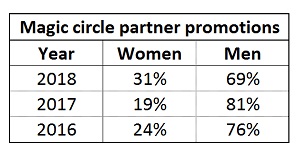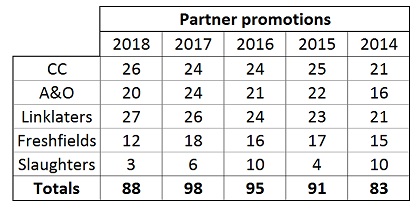Magic circle promotions fall to five-year low as CC and Linklaters drive progress on gender
Number of magic circle lawyers making partner dips 10% as proportion of women rises
April 23, 2018 at 09:33 AM
3 minute read
The number of lawyers making partner at the magic circle has fallen to its lowest level since 2014, with this year's total down more than 10% on last year.
Across the five firms – Clifford Chance (CC), Slaughter and May, Linklaters, Freshfields Bruckhaus Deringer and Allen & Overy (A&O) – there were 88 new partners made up this year, down from 98 last year, marking the lowest overall total since 2014, when 83 were promoted.
However, despite the overall decrease, the proportion of women made up by the five firms has risen to a three-year high, with 27 female magic circle lawyers making the grade, equating to 31% of this year's partner class.
 Last year just 19% of all new magic circle partners were female, while in 2016, 24% of promotions across the five firms were women.
Last year just 19% of all new magic circle partners were female, while in 2016, 24% of promotions across the five firms were women.
This year's improved showing on gender diversity was principally driven by CC and Linklaters, both of which made up 10 women this year – significantly up on last year, when they promoted four and five women respectively.
However, the 20 female promotions at those two firms comprises almost three quarters of all new women partners at the magic circle this year, with A&O making up just two women for the second consecutive year, and Freshfields promoting three women out of 12.
A&O recently redoubled its efforts to boost gender diversity, announcing the launch of a new remote working hub office in Vauxhall as part of a push to make itself the 'go to' firm for women. It currently has an 18% female partnership and is aiming to increase this to 20% by 2020. Freshfields, meanwhile, has just 14% female partners and, while the firm states that it is "considering a number of mechanisms" to help it become more gender diverse, it does not have any specific targets.
 CC and Linklaters were the only two of the elite five firms to make up more partners this year than last, with promotions falling 17% at A&O, 33% at Freshfields and 50% at Slaughters.
CC and Linklaters were the only two of the elite five firms to make up more partners this year than last, with promotions falling 17% at A&O, 33% at Freshfields and 50% at Slaughters.
Looking at promotions by geography, the number of UK magic circle promotions fell by nearly 20% on last year, from 35 to 29, the lowest figure since since 2015. Continental European promotions dropped off even more heavily, falling by 35% to 24, marking a four-year low.
In contrast, there has been a marked increase in the number of new Asia-Pacific partners, with 23 made up this year. The figure has been steadily increasing in recent years and is now almost double 2015′s figure of 12.
This content has been archived. It is available through our partners, LexisNexis® and Bloomberg Law.
To view this content, please continue to their sites.
Not a Lexis Subscriber?
Subscribe Now
Not a Bloomberg Law Subscriber?
Subscribe Now
NOT FOR REPRINT
© 2025 ALM Global, LLC, All Rights Reserved. Request academic re-use from www.copyright.com. All other uses, submit a request to [email protected]. For more information visit Asset & Logo Licensing.
You Might Like
View All
KPMG's Bid To Practice Law in US On Hold As Arizona Court Exercises Caution

Combative Arguments at EU's Highest Court Over Google's €4.13B Antitrust Fine Emphasize High Stakes and Invoke Trump
4 minute read
Law Firms 'Struggling' With Partner Pay Segmentation, as Top Rainmakers Bring In More Revenue
5 minute readTrending Stories
- 1Uber Files RICO Suit Against Plaintiff-Side Firms Alleging Fraudulent Injury Claims
- 2The Law Firm Disrupted: Scrutinizing the Elephant More Than the Mouse
- 3Inherent Diminished Value Damages Unavailable to 3rd-Party Claimants, Court Says
- 4Pa. Defense Firm Sued by Client Over Ex-Eagles Player's $43.5M Med Mal Win
- 5Losses Mount at Morris Manning, but Departing Ex-Chair Stays Bullish About His Old Firm's Future
Who Got The Work
J. Brugh Lower of Gibbons has entered an appearance for industrial equipment supplier Devco Corporation in a pending trademark infringement lawsuit. The suit, accusing the defendant of selling knock-off Graco products, was filed Dec. 18 in New Jersey District Court by Rivkin Radler on behalf of Graco Inc. and Graco Minnesota. The case, assigned to U.S. District Judge Zahid N. Quraishi, is 3:24-cv-11294, Graco Inc. et al v. Devco Corporation.
Who Got The Work
Rebecca Maller-Stein and Kent A. Yalowitz of Arnold & Porter Kaye Scholer have entered their appearances for Hanaco Venture Capital and its executives, Lior Prosor and David Frankel, in a pending securities lawsuit. The action, filed on Dec. 24 in New York Southern District Court by Zell, Aron & Co. on behalf of Goldeneye Advisors, accuses the defendants of negligently and fraudulently managing the plaintiff's $1 million investment. The case, assigned to U.S. District Judge Vernon S. Broderick, is 1:24-cv-09918, Goldeneye Advisors, LLC v. Hanaco Venture Capital, Ltd. et al.
Who Got The Work
Attorneys from A&O Shearman has stepped in as defense counsel for Toronto-Dominion Bank and other defendants in a pending securities class action. The suit, filed Dec. 11 in New York Southern District Court by Bleichmar Fonti & Auld, accuses the defendants of concealing the bank's 'pervasive' deficiencies in regards to its compliance with the Bank Secrecy Act and the quality of its anti-money laundering controls. The case, assigned to U.S. District Judge Arun Subramanian, is 1:24-cv-09445, Gonzalez v. The Toronto-Dominion Bank et al.
Who Got The Work
Crown Castle International, a Pennsylvania company providing shared communications infrastructure, has turned to Luke D. Wolf of Gordon Rees Scully Mansukhani to fend off a pending breach-of-contract lawsuit. The court action, filed Nov. 25 in Michigan Eastern District Court by Hooper Hathaway PC on behalf of The Town Residences LLC, accuses Crown Castle of failing to transfer approximately $30,000 in utility payments from T-Mobile in breach of a roof-top lease and assignment agreement. The case, assigned to U.S. District Judge Susan K. Declercq, is 2:24-cv-13131, The Town Residences LLC v. T-Mobile US, Inc. et al.
Who Got The Work
Wilfred P. Coronato and Daniel M. Schwartz of McCarter & English have stepped in as defense counsel to Electrolux Home Products Inc. in a pending product liability lawsuit. The court action, filed Nov. 26 in New York Eastern District Court by Poulos Lopiccolo PC and Nagel Rice LLP on behalf of David Stern, alleges that the defendant's refrigerators’ drawers and shelving repeatedly break and fall apart within months after purchase. The case, assigned to U.S. District Judge Joan M. Azrack, is 2:24-cv-08204, Stern v. Electrolux Home Products, Inc.
Featured Firms
Law Offices of Gary Martin Hays & Associates, P.C.
(470) 294-1674
Law Offices of Mark E. Salomone
(857) 444-6468
Smith & Hassler
(713) 739-1250










